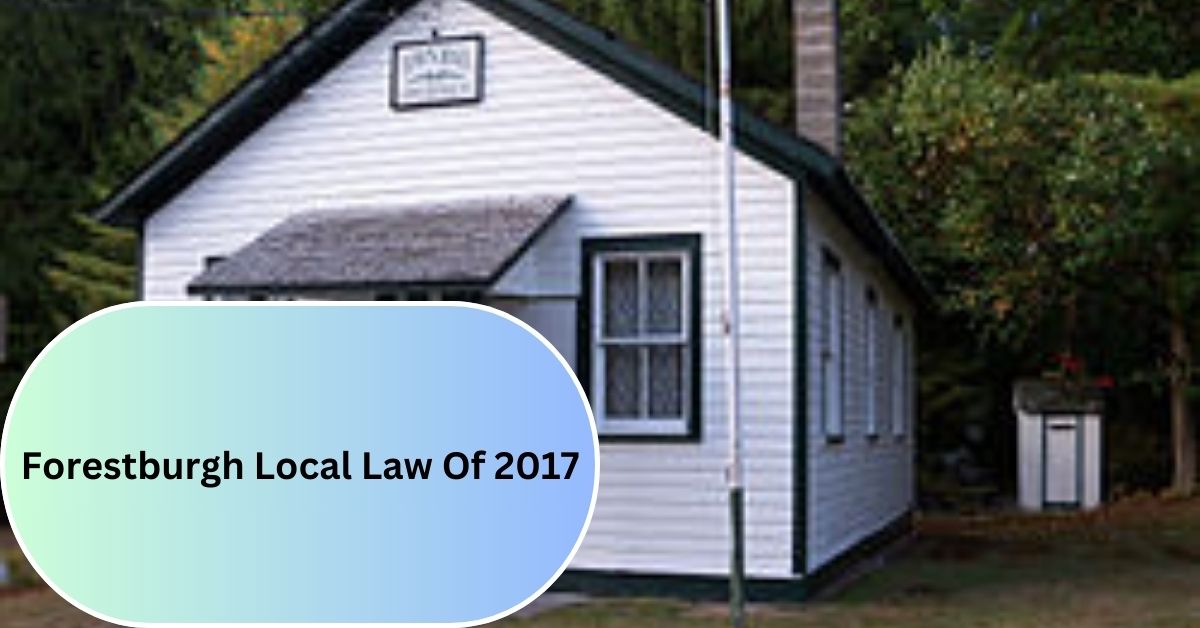Local laws are essential in how small communities govern themselves and their daily activities. They bestow a specific area’s culture, values, and needs while seeking to address specific challenges.
This is the case with Forestburgh Local Law of 2017, which provides legislation for managing and guiding local community development, land usage, and regulations. Forestburgh is one of the smallest towns of Sullivan County, New York, known for its serenity and rural scenic views.
The law passed 2017 targeted certain community concerns, among them was changing its zoning laws and strategies about using land. Really, the enactment of this law exemplifies commitment by the town in growth development on one side while being protective of its natural endowment and citizens’ welfare.
Table of Contents
Background Of Forestburgh Local Law Of 2017:
Prior to the Forestburgh Local Law of 2017, the town’s regulatory framework was not in a position to meet the community’s changing needs.
The zoning and land use laws were outdated and did not effectively address new challenges. The regulations often led to confusion, delays, and disputes, especially as the town was experiencing growth in both residential and commercial sectors.
One of the other reasons that gave birth to this law was an increased demand to develop Forestburgh. Many people were settling in the place, and other businesses desired to set their operations as well.
With this surge, there came a need to have more precise guidelines on what could be done with lands. Simultaneously, there was an urge to preserve the town’s rural nature and natural atmosphere, because these were fundamental to it.
The laws that existed were too rigid to allow for growth but still keep the character of the town. It was also unclear, causing property owners and developers much confusion on how to utilize their land. This made things drag and resulted in frustration.
Key Provisions Of The Forestburgh Local Law Of 2017:
As the town started experiencing growth and interest in property development, the need arose to update the regulations on balancing new developments with the protection of the character of the town.
Zoning And Land Use Confusion:
Former zoning laws were vague and often caused confusion on what kinds of developments could be undertaken in a particular area. This led to the challenge for property owners and developers as to what they could or could not do on their property.
Increased Development Interest:
As Forestburgh became more desirable, property developers and business owners became increasingly interested. The town needed regulations that would accommodate this increased interest while maintaining control over how and where development could occur.
Environmental Protection:
Another important consideration was the preservation of the natural environment of Forestburgh, such as open spaces and water bodies, from the detrimental impact of uncontrolled growth.
Ensuring Responsible Growth:
The town sought to control growth so that growth is beneficial to the community and avoids overdevelopment and maintaining a rural feel that most of its residents enjoy.
Public Reaction To The Forestburgh Local Law Of 2017
Support For Preservation:
Many residents and environmental advocates backed the law believing that it will help preserve the countryside nature and the rural characteristic of Forestburgh and secure its natural resources.
It was required by such citizens to ensure control of overdevelopment and the presence of greenery in preserving town aesthetics and character.
Concerns From Property Owners:
While some of the property owners and developers criticized the law. They felt that these updated zoning regulations imposed unnecessary restrictions on what they could do with their land.
The law could also limit the potential for economic development within the area by limiting property values. This group contended that the new regulations were too restrictive and that it would make it hard to pursue projects that economically would benefit the community.
Unequal Impact On Different Areas:
Some residents expressed concerns that the law would disproportionately impact specific neighbourhoods or property owners.
There were debates over whether the law treated all parts of Forestburgh equally or favoured some areas over others. This concern centred around how the law divided zoning districts and the types of development allowed in each district.
Any Challenges Or Disputes Arising After Implementation Of Forestburgh Local Law Of 2017:
Legal Challenges:
Other property owners challenged the law in court by asserting violation of rights over their respective properties or the nonobservance of state laws. The common points of debate were usually about whether these new regulations on zoning presented too much of a hassle or whether they contravened constitutional rights, like the use of one’s property at discretion.
Zoning Conflicts:
Most local zoning laws shared this story. Property owners were still confronted with the town’s or city’s local planning board, or even its zoning board, on occasions.
As people sought to develop the properties in manners that new law did not allow; disputes would always arise at times. It sometimes triggered some appeals to the town’s board or court litigations, which claimed such a law is too stiff.
Economic Development Concerns:
Others were arguing that such a law would restrain the growth because it would put some constraints on commercial developments or high-scale residential projects.
They further argued that town would be deprived of economic advantages, like extra revenue through taxes, and also the generation of employment due to the limitation imposed by such a law that made certain properties hard to develop.
Calls For Amendments:
Some time later, some members of the community started demanding amendments or changes to the law, arguing that the regulations should be changed to better fit new forms of development or to correct perceived inconsistencies.
Residents from more rural parts of Forestburgh argued that the law was too restrictive over agricultural or recreational land. Developers and business owners lobbied for greater flexibility in the types of projects that could be approved.
Implementation And Enforcement Of The Law:
Enforcement And Monitoring:
The enforcement procedures of the Forestburgh Local Law 2017 are quite explicit. The local government established a framework which ensured the developments and land usage within that area would comply with the town’s goals. Such things included monitoring zoning changes, property development, and land use to preserve the area’s rural character.
Role Of Planning And Zoning Boards:
The planning and zoning boards are vital in implementing the law. They ensure any proposal for new construction or changing land usage complies with the town’s regulations. This maintains the character of the town while giving room for controlled development.
Local Officials’ Responsibilities:
The town supervisor and enforcement officers, who are local, also enforce the regulations. They look at properties and projects, checking whether they are compliant to the law. When a case of violation is noticed, the officials issue warnings and penalties to bring out remedial action on time.
Public Education:
The town holds public meetings and provides informational materials to ensure residents and developers understand the law. This effort helps the community stay informed about the law’s requirements and ensures everyone knows their obligations.
Reporting Violations:
Community members can report potential violations through established channels, allowing the public to actively participate in ensuring compliance. Local authorities review reports, investigate, and take appropriate action.
Challenges In Enforcement:
Enforcement has faced challenges, with some residents and developers questioning the law’s application. Disagreements have occurred over specific provisions, especially when perceived as restrictive.
Commitment To Compliance:
Despite challenges, the town government remains dedicated to enforcing the law. Through clear procedures and public engagement, Forestburgh aims to maintain a balanced approach to development and land use while upholding the community’s values.
Comparing Forestburgh Local Law Of 2017 To Other Local Laws:
| Aspect | Forestburgh Local Law of 2017 | Neighboring Local Laws |
| General Focus | Emphasis on land use and zoning regulations | Focus on land use, zoning, and environmental controls |
| Development Restrictions | More restrictive, with limits on building height and land usage | Varies; some have more relaxed zoning to encourage development |
| Community Involvement | High, with regular public meetings and feedback opportunities | Limited involvement; fewer public hearings |
| Zoning Regulations | Stricter zoning for residential and commercial areas | More flexible in some areas to attract growth |
| Environmental Protection | Strong focus on maintaining green spaces and rural character | Similar, but with variations in enforcement and focus areas |
| Land Use Flexibility | Limited flexibility for non-residential development | More flexibility in certain areas for businesses and housing |
| Planning and Decision-making | Involves planning boards and zoning committees for compliance | Similar, but some towns may have fewer checks or different procedures |
| Impact on Growth | Slower growth due to restrictions | Faster growth in towns with less restrictive laws |
| Public Participation | Frequent opportunities for public feedback | Fewer opportunities for public input |
Future Directions For Forestburgh Local Law Of 2017:
The Forestburgh Local Law of 2017 may see changes as the needs of the community shift. Feedback from residents, business owners, and local officials could lead to updates, particularly in areas like zoning and development guidelines.
These updates might allow for new types of growth or adjust current environmental protections to suit future conditions better. The law could shape Forestburgh’s development to balance growth with preservation. It might encourage controlled expansion, helping maintain the area’s rural character.
As the community evolves, there could be room for more flexibility in land use, ensuring that the town adapts while keeping its unique qualities intact. Over time, the law’s impact may result in a stronger local economy, better infrastructure, and a clearer sense of identity for Forestburgh.
Final Views:
The Forestburgh Local Law of 2017 represents a significant step in evolving the town’s governance, addressing long-standing challenges and guiding the future of land use, zoning, and development. Providing a more transparent decision-making framework has introduced a balance between preserving the community’s character and promoting sustainable growth.
As seen in the various provisions and the response from residents, the law reflects the town’s commitment to ensuring its development aligns with the needs of its people and the environment.
By closely monitoring its impact, the city and its residents can work together to navigate the challenges and seize the opportunities that arise, ensuring that Forestburgh remains a vibrant, sustainable community for years.
Through its careful implementation and potential for further refinement, the law can guide Forestburgh in a way that respects its heritage while preparing it for the future.





